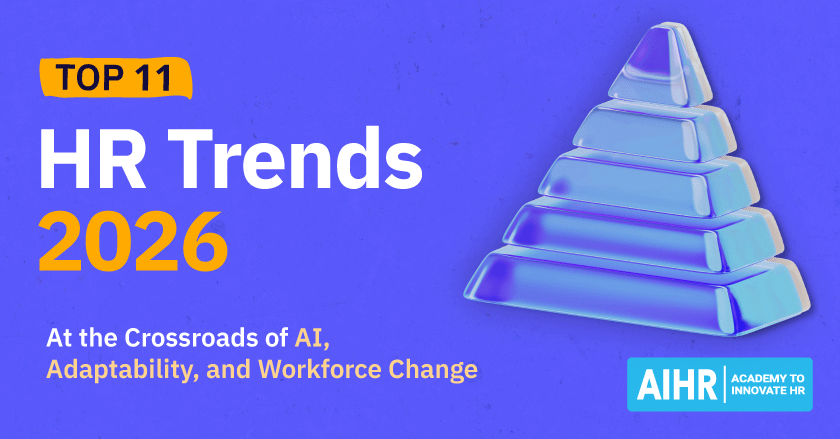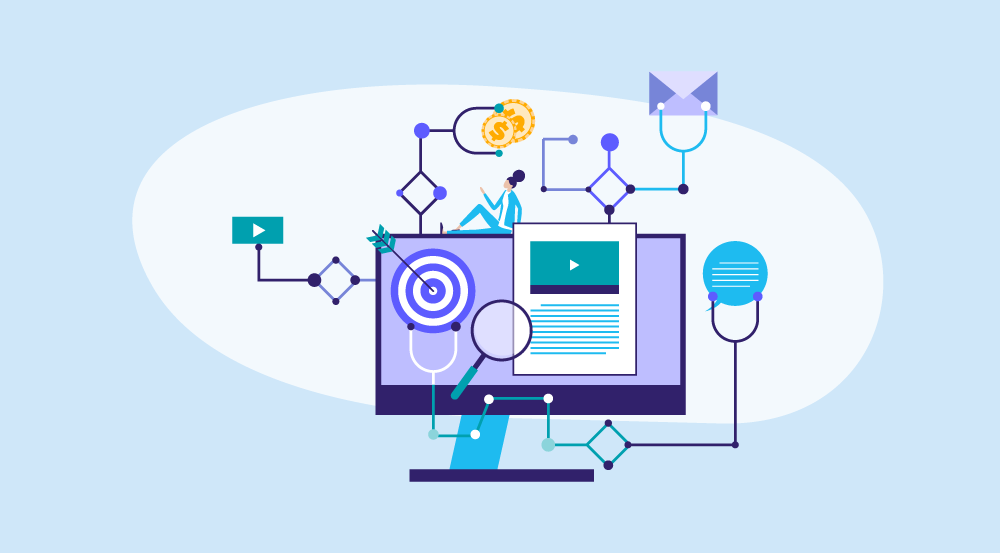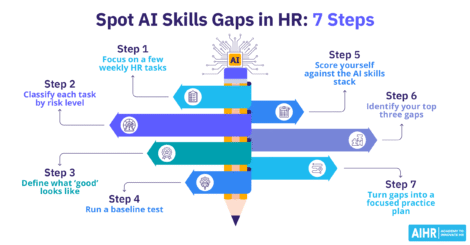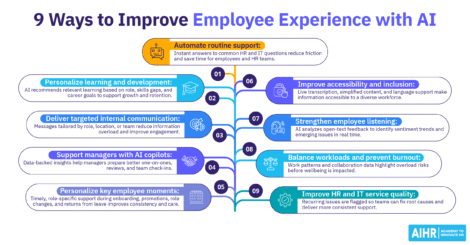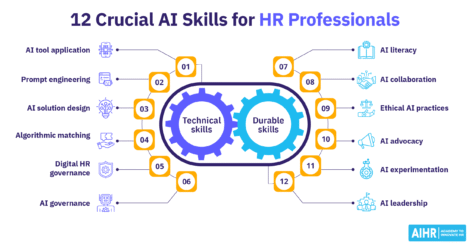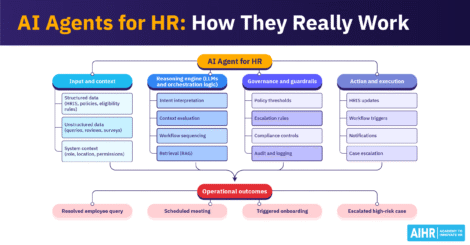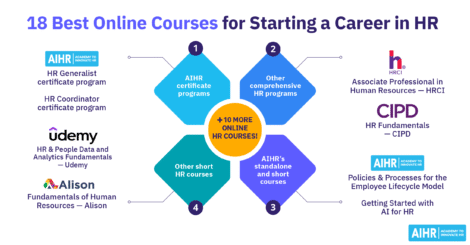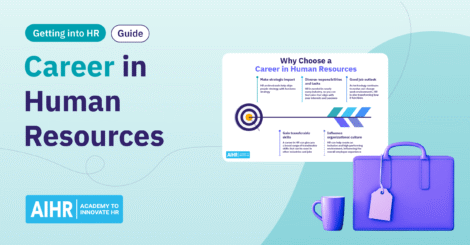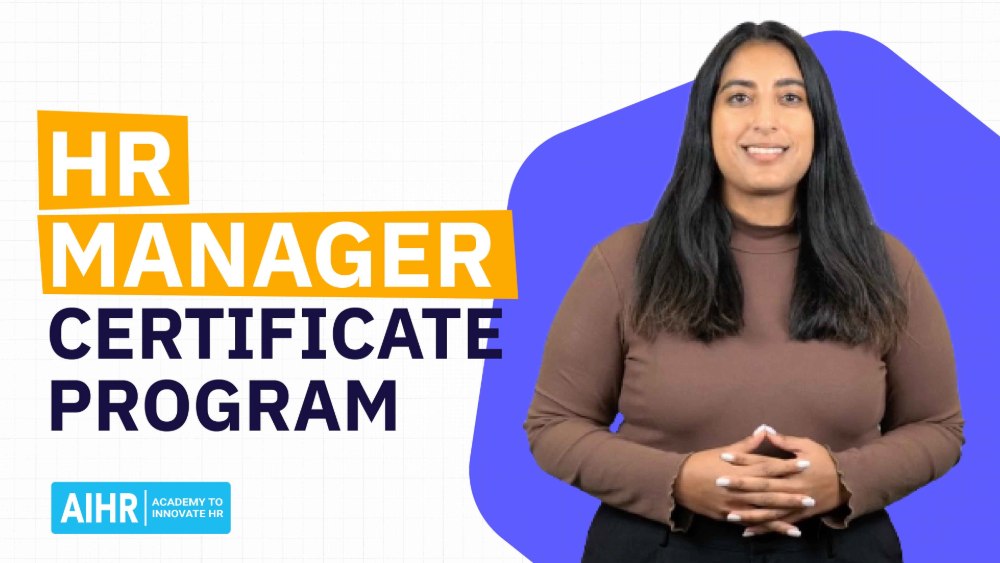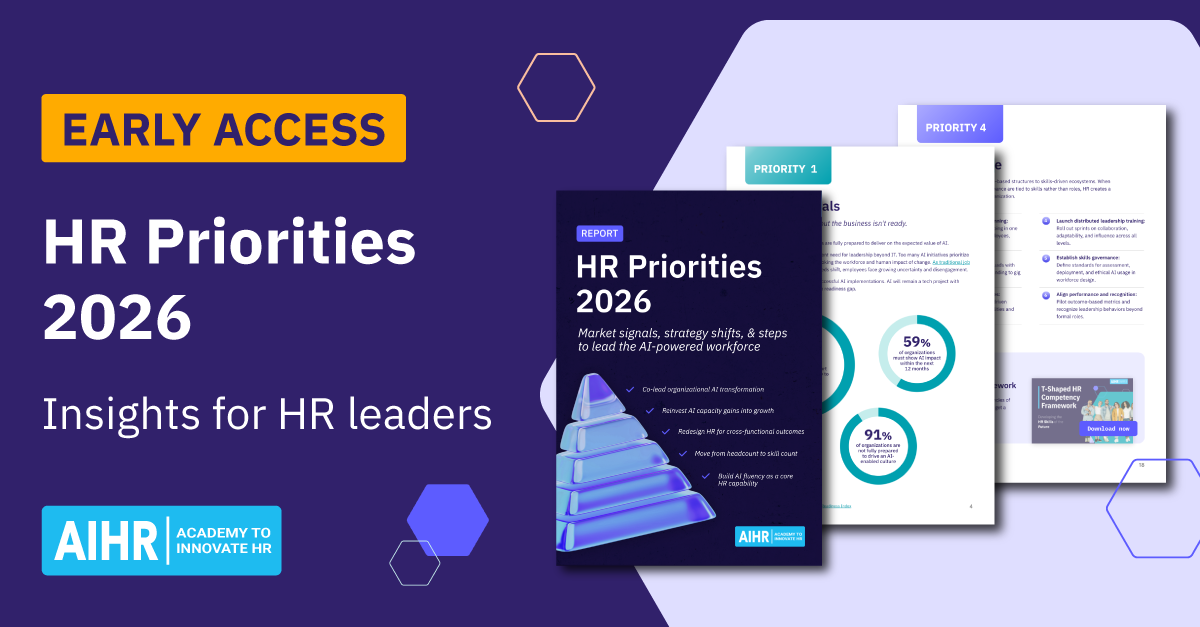If you’re a Human Resources leader, then you’re quickly learning that HR AI tools are changing how companies recruit, train, and support their workforce. The impact of AI is too big to ignore. In fact, 76% of HR leaders believe that not adopting AI within the next 1-2 years will put them behind their competitors. This means you have to get moving, fast.
Because AI is evolving so quickly, many HR leaders and teams struggle to keep up – not only with what’s possible, but also with the sheer volume of tools entering the market. From resume screening and interview scheduling to personalized learning and turnover forecasting, the number of AI solutions aimed at HR keeps growing. This mix of unfamiliarity and overload can make it hard to know where to start or which tools will actually help.
Whether you’re at a fast-paced, growing startup or a large corporation, the rise of AI-powered HR tools offers opportunities to tighten up your HR processes and increase strategic impact, all while keeping people at the center of it all.
In this article, we’ll share a list of 47 HR AI tools across different areas of HR that can help you kickstart your research on what technology would be most effective in advancing your goals. We’ll also discuss some key points that HR leaders need to know when implementing AI tools. Let’s dive in.
Contents
AI recruiting tools
AI tools for training and development
AI employee scheduling tools
AI leadership development tools
AI tools for HR automation
HR chatbots and virtual assistants
AI tools for performance management and employee engagement
AI tools for employee wellbeing
Free AI tools for HR
What HR leaders need to know about implementing AI tools
AI recruiting tools
Let’s start with recruiting. AI recruiting tools streamline and speed up tasks like sourcing, screening, interview scheduling, interview note-taking and analysis, and more. They help recruiters focus more on strategy and candidate engagement by handling time-consuming, repetitive steps in the hiring process.
- Eightfold.ai: Talent intelligence software that helps match candidates to jobs using algorithms focused on skills, not just resumes.
- Fetcher: Combines AI sourcing with personalized email outreach to automatically engage passive candidates.
- Paradox: A conversational recruiting assistant that screens candidates, schedules interviews, and answers FAQ 24/7.
- Seekout: Agentic AI talent intelligence platform that enables recruiters to search across hundreds of millions of public and internal profiles, apply advanced filters, and automate personalized outreach to uncover and engage hard‑to‑find candidates efficiently.
- Metaview.ai: Uses AI to take notes during interviews, summarize key insights, and score candidates based on competencies and context.
- Workable: Offers AI-suggested candidates, job description optimization, and assessment tools within an easy-to-use ATS.
- iCIMS Talent Cloud: AI features include candidate matching, diversity filters, and pipeline automation.
AI tools for training and development
AI tools for training and development personalize learning by recommending content based on employees’ roles, skills, and goals, automate content creation, help track engagement, and identify skill gaps, making L&D programs more targeted and scalable.
- SC Training: A mobile-first learning platform using AI to recommend microlearning modules based on user behavior and skills gaps.
- 360learning: Used for compliance training, onboarding, frontline staff training, and more.
- Fuse Universal: Learning systems that make learning simple with next-level generation of model learning.
- Docebo: AI curates course recommendations and helps learning administrators track engagement patterns and skill mastery.
- Cornerstone Learning: AI matches learning content to job roles and performance metrics for individualized growth plans.
- Fuel50: Maps employee skills and career journeys using AI to suggest learning modules, mentors, and new role trajectories to close skills gaps.
New AI tools are transforming HR, but using them responsibly and strategically requires more than curiosity. To truly benefit from AI, your team needs a strong foundation in how it works and where it fits.
With AIHR’s AI for HR Boot Camp, your team will:
✅ Build AI fluency needed to lead in a tech-enabled HR function
✅ Learn how to integrate AI into real HR workflows
✅ Understand the risks, limitations, and ethical considerations of AI in HR
🎯 Turn early adoption into long-term impact with a team fluent in AI.
AI employee scheduling tools
Who hasn’t come across workforce scheduling nightmares? It can be beyond challenging and time-consuming to maintain employee schedules that are not at least somewhat automated.
- Quinyx: Forecasts labor needs and auto-generates compliant, optimized work schedules based on employee preferences and availability.
- Zia AI by Zoho People: Offers predictive leave and attendance tracking with smart assistant capabilities for shift management.
- Deputy: Automatically assigns shifts, flags potential conflicts, and forecasts employee workload trends.
- Shiftboard: Designed for mission-critical industries, using AI to minimize overtime and boost workforce coverage.
- TeamSense: A text-first automated absence management reporting system.
AI leadership development tools
AI leadership development tools use data and personalized insights to support managers in building key skills, improving team dynamics, and making better decisions. They often include virtual coaching and action planning tailored to each leader’s context and goals.
- CoachHub: CoachHub’s leadership development offering includes AIMY™, an AI coach grounded in behavioral science that provides personalized, 24/7 career guidance, from goal-setting to practicing difficult conversations.
- Valence: An AI coach that helps managers and their teams stay more aligned, learn faster, and work better together by diagnosing team health, giving practical leadership support, and guiding follow‑up, all at scale and in everyday workflow contexts.
- BetterUp: BetterUp Lead™ combines premium one‑on‑one leadership coaching with intelligent AI support, using behavioral assessments, session insights, and personalized learning recommendations to help executives and high-potential leaders sharpen skills, drive team impact, and align growth with business goals.
- Retorio: AI coaching platform that uses immersive video role plays and behavioral analysis to give leaders real-time feedback on communication, emotional intelligence, and decision-making skills.
- Sana: Combines AI-guided coaching, peer learning, and live training tools to help every manager build real-world leadership skills, timed to key milestones and tailored to their growth needs.
- Monark: This AI-powered leadership platform lets managers set goals, take micro-lessons, role-play real-world scenarios (like difficult feedback or performance reviews), receive instant behavioral feedback, and practice until they’re confident.
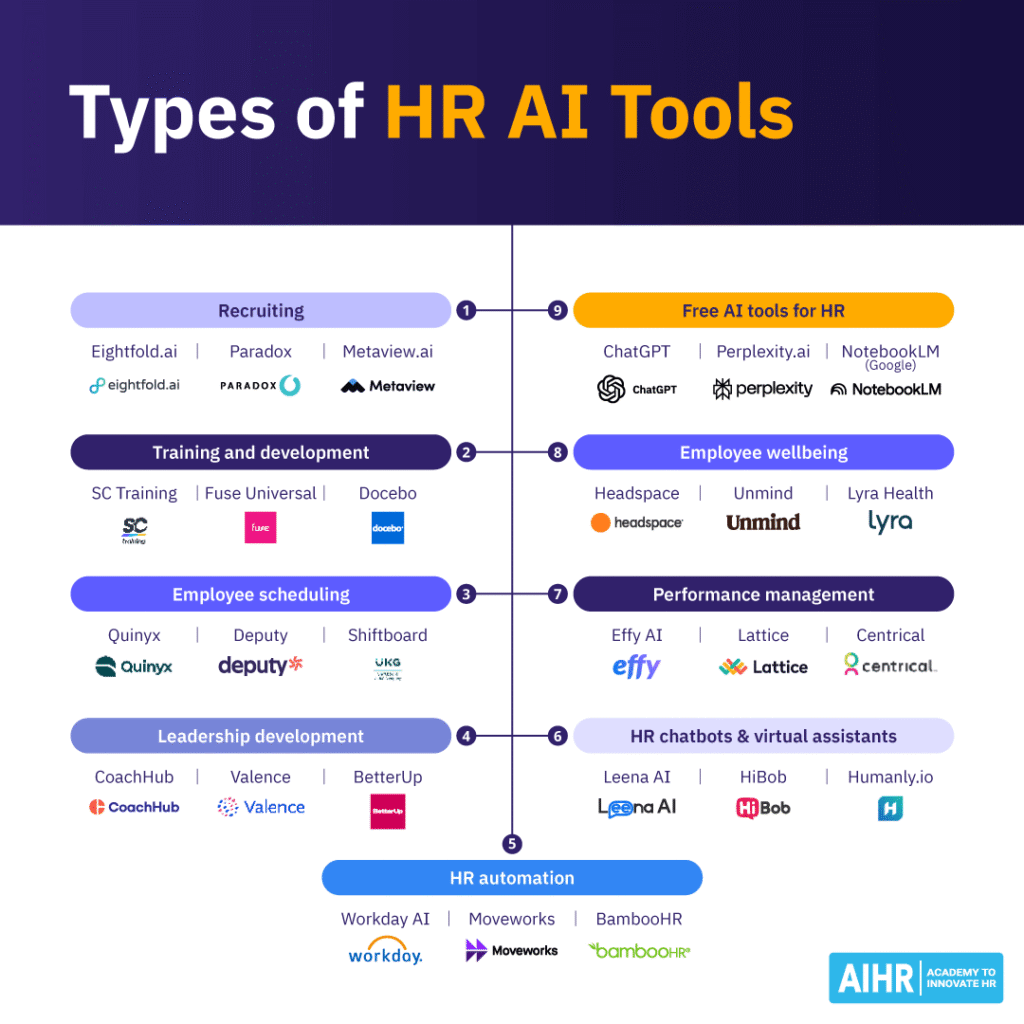
AI tools for HR automation
Who doesn’t want to automate the repetitive and heavily administrative HR tasks? AI-powered HR automation tools help you do just that.
- Workday: A popular human capital management platform offers AI functionality across multiple modules, including recruiting, reporting, talent mobility, and performance, helping teams make faster, better decisions.
- HiBob: HiBob’s HR automation lets HR teams set up reusable, milestone-driven workflows (from onboarding to promotions and more), with automated reminders, conditional triggers, and stakeholder assignments to streamline HR operations and reduce manual effort.
- Rival HR: Provides onboarding and talent lifecycle automation tools powered by AI for smoother employee experiences.
- Gusto: HR and payroll platform that also uses AI to facilitate recruiting, onboarding, talent management, time and attendance tracking, compliance, and employee benefits.
- UiPath: Uses AI-powered agents and bots to orchestrate end-to-end HR workflows, handling tasks like resume screening, onboarding, payroll updates, absence verification, and helpdesk queries across systems like SAP and Workday.
HR chatbots and virtual assistants
HR chatbots & virtual assistants are becoming increasingly capable and valuable for HR teams. They reduce the burden on HR practitioners by automating routine support while keeping interactions personal and on-brand.
- Leena AI: AI chatbot for HR support that handles FAQ, policy navigation, onboarding, and even document generation.
- MeBeBot: Plug-and-play HR chatbot that integrates with Slack and Teams to assist with everything from onboarding to IT tickets.
- Amber by inFeedo: AI assistant that collects employee feedback during key moments (joining, promotion, exit) to measure engagement and prevent burnout and turnover.
- Humanly.io: Automates screening conversations, captures candidate responses, and offers real-time candidate scoring.
- Moveworks: Delivers an enterprise-grade conversational AI assistant that understands employees’ HR queries (like PTO, benefits, payroll, onboarding) across 100+ languages, taps into multiple back-end systems, and autonomously resolves tasks or escalates them, helping HR teams reclaim time and reduce support load.
AI tools for performance management and employee engagement
Performance management and employee engagement are at the core of HR. AI tools in this area of HR help track goals, surface feedback trends, and personalize recognition or support. They use data to highlight engagement risks, improve review consistency, and give managers timely insights to better support their teams.
- Effy AI: AI-enhanced 360° feedback platform with auto-generated performance summaries and coaching suggestions.
- Lattice: Uses AI to identify performance trends, flag disengagement risks, and personalize feedback delivery.
- Predictive Index: Employee behavioral insights tool with AI-based coaching and performance optimization features.
- Centrical: Aimed at the frontline workforce, this platform gamifies performance, uses AI to recognize achievements, and nudges employees to hit key targets.
- Weeve AI: An AI-based employee listening platform that uses NLP to measure sentiment and suggest interventions in the healthcare industry.
- Culture Amp: Adds sentiment analysis and predictive analytics to regular engagement surveys for actionable feedback.
AI tools for employee wellbeing
AI tools for employee wellbeing offer personalized check-ins, nudges, and resources to support mental health and work-life balance.
- Headspace: Includes a conversational AI companion built by clinical psychologists and powered by motivational interviewing, which helps employees reflect on their emotions and receive personalized mindfulness in-app content anytime they need support.
- Unmind: An AI-driven mental health and wellbeing platform that provides content, tools, and training to support employee mental health.
- Lyra Health: Combines AI and human expertise to offer personalized mental health support, including coaching, therapy, and digital wellness tools.
Free AI tools for HR
Not every powerful tool requires a hefty price tag. There are free AI tools HR can use that offer value with little or no investment.
- ChatGPT: HR professionals can use this popular generative AI tool to help generate job descriptions, write policy templates, craft emails, create ideas for employee recognition, and more.
- Perplexity.ai: A powerful AI-powered tool for HR research with source citations, so teams can make faster, data-backed decisions without digging through endless information.
- NotebookLM (Google): An AI notebook assistant that organizes documents, onboarding and training materials, and lets you query content contextually.
- YouLearn.ai: Free AI tool to create interactive training modules, quizzes, and micro-courses for internal teams.
What HR leaders need to know about implementing AI tools
Let’s face it, without the right tools and systems, HR often spends a good part of its time managing paperwork, monitoring compliance, and handling routine or administrative tasks. AI can help facilitate, minimize, and even completely eliminate various tasks so you and your HR team can focus on employees and other strategic HR work and initiatives.
While the promise of HR AI software is exciting, implementation success depends on a clear, intentional approach. Here’s a brief guide on how to get started:
1. Start with key use cases
Don’t try to transform everything overnight. Identify your main HR pain points. Pick an area, like interview scheduling, and pilot a solution. Define what success looks like, such as hours saved per week, etc., and measure it carefully and accurately.
Once you’ve seen real results and gathered feedback, you’ll be in a better position to refine the approach and roll it out more broadly across the organization.
2. Prioritize impact and efficiency
Look for tools that offer a high return on equity (ROI) in a time-efficient manner. HR automation tools, like Moveworks or Leena AI, often reduce helpdesk tickets or repetitive administrative tasks by over 60%. This frees you and your team up for strategic tasks.
3. Test, tweak, and train
Try out a few different tools to see what fits best – many vendors offer free trials or demos. Use a small pilot group to compare options, gather feedback, and spot potential issues early. Then, train users so they understand both the capabilities and limits of the chosen tool.
4. Check your current stack for AI capabilities
Many commonly used platforms (Workday, Zoho, BambooHR, Cornerstone) already offer AI modules. Audit your current tools before buying something new because you may be pleasantly surprised to discover that your systems already have access to useful AI features.
Determine if you want to upgrade to one central hub for all things HR, or a platform that just streamlines a few of your key HR processes.
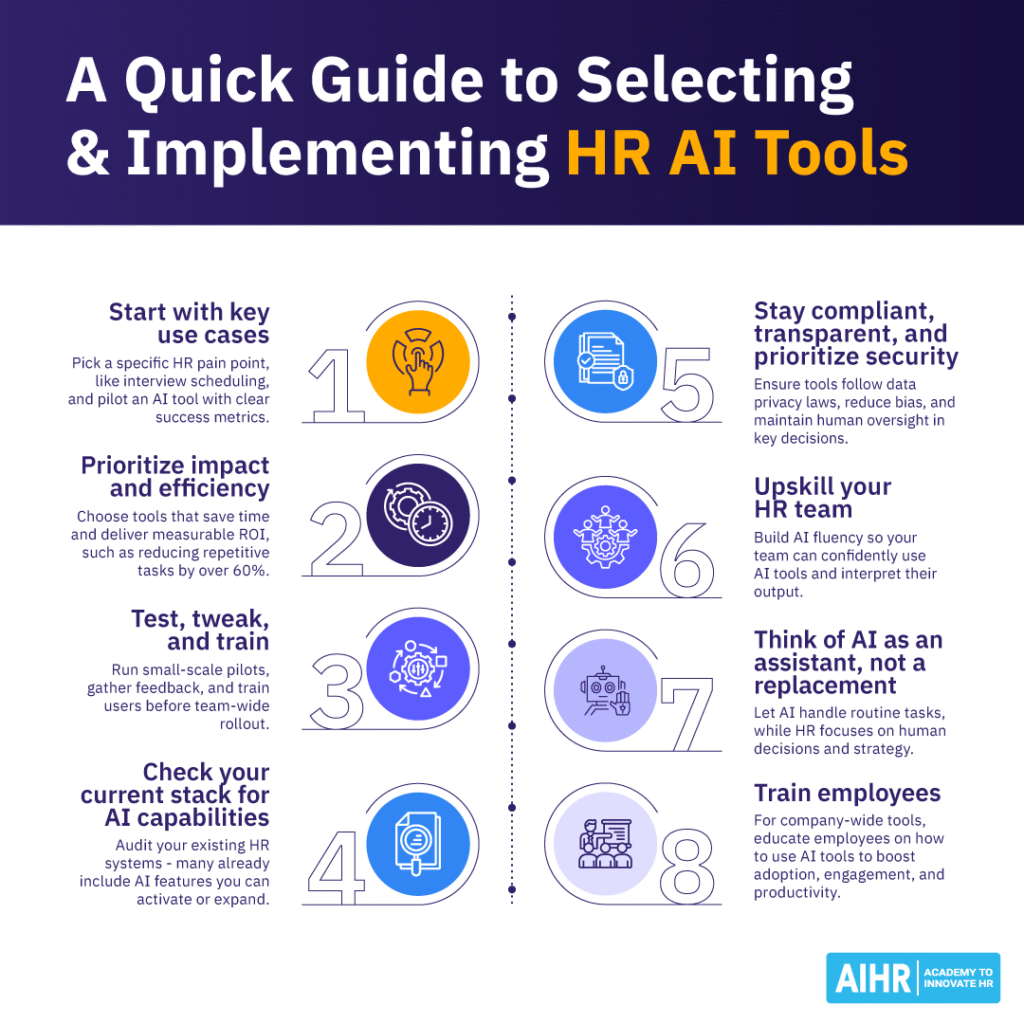
5. Stay compliant, transparent, and prioritize security
AI introduces new challenges around bias, data privacy, and decision-making. As you know, HR handles highly sensitive employee and company information, so you must find a provider with high data security and privacy standards.
Make sure that any AI-powered HR tools follow data protection laws and maintain human oversight in decisions that affect hiring, promotions, or compensation. AI is wonderful, but it doesn’t replace the human eye!
6. Upskill your HR team
To get the most from AI, your HR team needs to understand the fundamentals of prompting, as well as how to interpret and apply AI insights.
This doesn’t mean turning your team into AI experts. It means building a decent level of AI fluency so they can use the tools confidently and responsibly.
If you want to learn how you can assess current AI competencies within your HR team and effectively build the skills needed for AI-augmented HR teams, download AIHR’s HR Leader’s Guide to Building AI Competencies.
7. Think of AI as an assistant, not a replacement
AI tools are most effective when complementing human judgment, not replacing it. Let AI handle the heavy lifting, like sourcing candidates or summarizing performance reviews, and leave the people/HR decisions to people.
As a general rule, AI isn’t here to take an HR employee’s job. Rather, it can help them do their jobs better and more efficiently.
8. Train employees
Some AI tools, such as those used for learning, performance, or feedback, require employees to engage with them directly, so proper training is essential.
The more your workers understand about AI and what it can help them with, the less intimidated they’ll feel and the more value they’ll get from the tools. In turn, this will increase engagement, productivity, and even morale.
Use training methods that meet the needs of your employees, whether it’s in-person training, computer-based training, or a combination of both. HR should be available to support employees going forward as they continue to use AI and provide additional or ongoing training, as needed.
Final thoughts: Human + AI = The future of HR
Like it or not, and whether we’re ready or not, AI is here to stay. Incorporating AI into your HR processes can be a worthwhile investment on many fronts, especially if you do it with care and follow a strategy that supports your business needs and objectives.
The increase of AI tools for HR professionals isn’t about replacing the “human” in Human Resources. Simply put, it’s about helping your HR team do their best work. Even though AI enhances HR accuracy and efficiency, it doesn’t fully replace the very real human element that’s critical for supporting the workforce, company culture, and cultivating positive relationships.
With that said, don’t rush the process. Take the time to research your AI options, find ones that meet your needs and are cost-effective, and can grow alongside your business.
Ultimately, the most successful HR teams will be those who embrace AI thoughtfully, starting small, measuring impact, and always keeping people at the center of their strategy. The future of HR isn’t just digital. It’s human and AI-enhanced.


